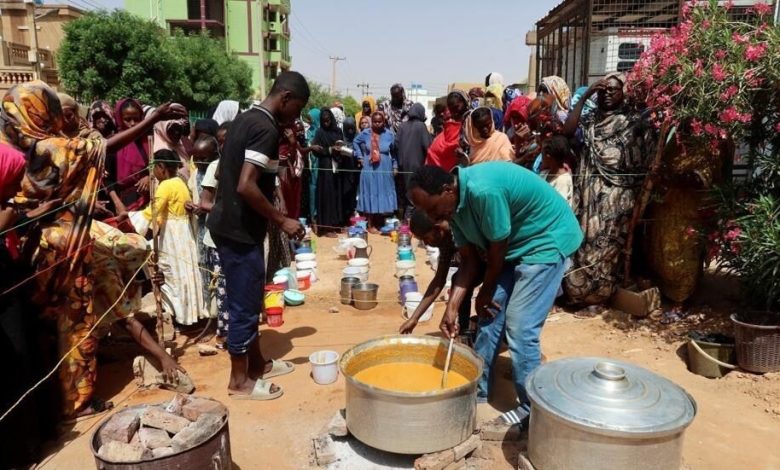Famine in Sudan.. Experts refute International Warnings

Sudan Events Report – Rehab Abdullah
Economic experts refuted the warnings about Sudan being exposed to famine due to the outbreak of war, and justified this in terms of the country’s resources and expertise, and provided evidence that famine did not occur because the war continued for more than a year and the Sudanese economy is still resilient.
Economic expert and food security expert Dr. Mahdi Osman Al-Rikabi believed that Sudan will not starve, and attributed the talk of some external organizations and parties about expectations of Sudan being exposed to famine, and considered it talk for media consumption.
The resilience of the economy :
He said that as economists and experts, they affirmed that Sudan will not starve, and he demonstrated this by referring to the current situation, as the war has continued for more than a year and the Sudanese economy is still very resilient.
He said in the Food and Development Forum in a discussion session on (Will Sudan starve?) that this war is a big war, not a small one, and if it were not for the strength of the Sudanese economy, the economy would have collapsed and reached zero and hunger would have occurred. He also demonstrated that Sudan will not starve by saying that most of Sudan’s localities produce agricultural and animal products, whether in the eastern or northern states or the River Nile ,Damazin and Sennar, most of which produce vegetables and livestock. He expressed his astonishment that there is talk of hunger while Sudan has more than 130,000 heads that were not greatly affected by the war, indicating that there are safe states that produced during the previous season and the war is ongoing and their production has appeared during this year, and most of the wheat production is in the northern states and is currently one of the safe states.
He reassured the government’s arrangements for agricultural production this season, as there is an arrangement regarding financing and providing all the needs of the agricultural season, which means the continuation of agricultural production, and he added “The season will not stop.”
Low commodity prices
But Al-Rikabi admitted that if there is a problem, it will be related to the low industrial products, and attributed this to the fact that most factories are located in Khartoum and the two most important commodities are oils and sugar, noting that the Minister of Trade explained in the last press conference that they tried to secure the import of basic industrial commodities, and stressed that there will be no problem even with these commodities, affirming the continuation of exports and imports during the war period, as Sudan exported gold that achieved large revenues during the war that exceeded those in the period before the war, noting that this affirms that the country has resources of foreign currency that enable it to import industrial commodities in which there is a shortage.
He continued, “The theory of a famine in Sudan occurs in two cases, one of which is impossible, the first is stopping production in all states and now practically production is continuing, secondly, in the event of stopping the export and import operations and closing the port of Port Sudan, and if this happens, its effect will not be temporary because there is a stock of the commodity in question that is sufficient for a specific period, so I see that this theory is incorrect.”
The impossibility of famine
Al-Rikabi called for benefiting from foreign relations and friends of Sudan in importing commodities in which there may be a shortage, and reassured of the impossibility of a famine.
He advised the governments in the states to encourage the production of industrial goods such as flour mills and oil presses, which absorb the shortage in them, and he saw the need for a shift in consumer behavior and a return to corn and mixed bread.
For his part, the former Undersecretary of the Audit Bureau, Barakat Hassan Ahmed, agreed with Al-Rikabi’s statement, and stressed that Sudan will not starve, nor will neighboring countries starve because it is a gateway for food products.
Transformation industries
Barakat affirmed that Sudan has a workforce characterized by experience and efficiency, and stressed the possibility of benefiting from it in the transformation industries after undergoing skill refinement, and called on the state to adopt a policy of including families in production programs from within their homes for self-sufficiency and then contributing to feeding the markets.
Marketing products
Barakat warned that such programs face a marketing problem, and many agricultural products suffer from a recession, noting that these products have a specific expiration date, including onions and fruits that face high transportation costs during the production season, which leads to their exposure to spoilage and the producer incurring losses, which requires the presence of small industries to dry and package these products and help in marketing them, and he noted that they are very desirable in foreign countries.
He affirmed the existence of ports in Sudan and we only need to open the crossings and enhance the passage of products, and he affirmed that they generate huge revenues for the country.
Poor distribution:
For his part, Dr. Mudawi affirmed in his interventions that Sudan will starve if the governors do not play their role in bridging the food gap from areas of abundant production to areas of scarcity and contribute to transportation from the area of abundance to the area of scarcity, noting that there are states with abundant production and poor distribution, for example, Gedarif produces huge quantities of corn, but it struggles to reach areas of scarcity in corn and others, and affirmed the intervention of the governors by holding a weekly meeting between them to manage food and coordination by presenting his report and the status of essential goods, which Mudawi considered avoiding any food gap.



